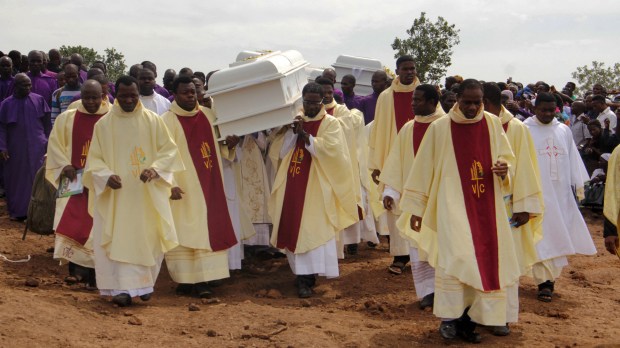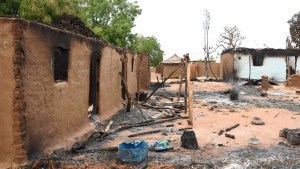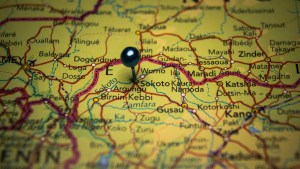Nigeria is the country with the largest Catholic Mass attendance in the world, according to a recent study. So when a diocese loses 13 parishes, it affects a lot of people.
That’s the case with the Diocese of Makurdi, in central Nigeria, where attacks on predominantly Christian villages over the past nine years have led to thousands of Catholics fleeing their homes.
Add to the mix the fact that in Nigeria, Catholic parishes consist of much more than a single church building. One parish might cover a 25-kilometer radius and have dozens of outpost chapels, serving thousands of believers.
Bishop Winfred Anagbe, CMF, of the Makurdi Diocese, and Fr. Remigius Ihyula, who heads the foundation for Justice, Development and Peace, an arm of the diocese, described the situation in an exclusive interview this month. The bishop and the priest spoke with Aleteia from the New York offices of Aid to the Church in Need, which sponsored their visit to the United States.
The diocese is situated in Benue State, which is predominantly Christian. It is, however, among the Nigerian states hardest hit by attacks from Islamist Fulani herdsmen. In 2022, Fulani herdsmen attacked 93 villages in Benue and killed 325 farmers, according to ACN. The Makurdi Diocese is active in several camps housing thousands of Internally Displaced People uprooted by the violence.
Disputing Nigerian government claims that it has the Islamist terrorist group Boko Haram under control, Bishop Anagbe said that Boko Haram has actually metamorphosed into “different sects,” including bandits in the northwestern part of Nigeria, who are known for kidnapping, raping, killing and destroying properties, and Fulani terrorists, who are active in the North Central part of Nigeria, including Benue.
Psychological effects
Fr. Ihyula said that the herdsmen are very well armed with AK-47s, machetes and other weapons. In one case, in January 2018, over 80 people were killed in an attack, and others died of their wounds afterwards.
[Photo above is from a mass burial of victims of an attack Gwer East district of Benue State, on May 22, 2018.]
“So that whole village and surrounding villages, because of fear, evacuated to nearby villages for safety,” the priest said. “So you are talking about thousands of people leaving because they are afraid that maybe the next attack might be on them.”
Even those who flee these towns and end up in camps for internally displaced persons are often at risk, Fr. Ihyula said. “The herdsmen sometimes find ways to come and attack them in the camps and kill them,” he said, noting that such an attack took place this past February.
In addition, many who have lived through Fulani attacks, especially those who have seen relatives killed, are suffering from post traumatic stress disorder. A general feeling of hopelessness comes about because people don’t know when they’ll be able to return to their homes.
Caused by climate change?
Bishop Anagbe strongly disputes the government’s claims that the main reasons behind the attacks include climate change — leading the herders to seek new grazing areas for their herds — and disputes between farmers and herdsmen.
“It is beyond climate issues, because climate issues are not a Nigerian problem alone; it’s a global issue,” he said. “Nations are not killing citizens to solve climate matters because no amount of killing will solve global warming or climate change.
“And it is not farmers-herders clashing, as they talk about in Benue, because no Fulani herdsmen are indigenous to Benue,” the bishop continued. “They are invaders, intruders into the state, and whether they are talking about climate change or grazing lands, why would it be that when they attack, they occupy the place of the farmers, and the natives don’t go back? I consider these things as expansion of territory of the Muslims, which is for me — I call it a religious war. And their attacks are such that churches are being destroyed, Christians are being killed, and so it’s a clear way of Islamization.”
The bishop has criticized the inaction of past governments to prevent further attacks. A new president, Bola Ahmed Adekunle Tinubu, was elected in March.
“I think it’s not because they don’t have the capacity, but the will is not there,” said Bishop Anagbe. “But we have a new government in place now, and as Christians we are people of hope, and we pray that the new government takes a different approach.”



